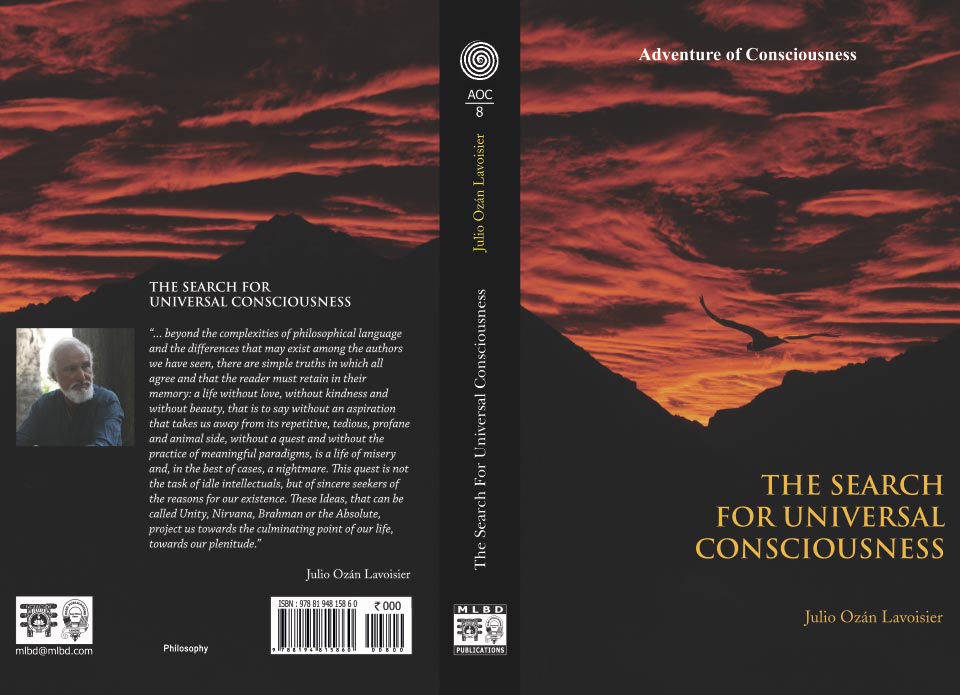Everything is sacred, the universe is a temple; it is ignorance that desecrate everything.
Inicio » THE SEARCH FOR UNIVERSAL CONSCIOUSNESS
THE SEARCH FOR UNIVERSAL CONSCIOUSNESS
This edition, published by Motilal Banarsidass Publishers in Delhi, India 2021, has garnered widespread interest and circulation in Europe. It has been listed as a Best Seller by AbeBooks (Advanced Book Exchange) in London and IberLibrocom in Spain.
(Published by Motilal Banarsidass Publishers, New Delhi, India, 2021.).
¨THE SEARCH FOR UNIVERSAL CONSCIOUSNESS¨ Motilal Banarsidass Publishers, Delhi. 2020. Surely the most prestigious publisher in India, founded in 1903. For more information about this publisher see Wikipedia.
In this treatise our author observes that all idealist philosophies have their origin in a transcendental intuition of fundamental Unity, which we find not only amongst thinkers but in all human beings as this Unity, according to him, is the very centre of the mind, not just of our species but of all living beings. In order to demonstrate this assertion, the author has followed and commented on the most sought after idealists from the origins till the present, and he ends with his transcendental idealism.
The value of the present work lies not just in the universal vision of the author, but also in that this vision is in line with a perspective, that he calls essential, that is used by Hinduism and Buddhism in its most essential and philosophical expressions. It can be said that the Search for Consciousness in the West is seen by a Western author from an Eastern perspective. This necessarily leads to the integration of the two cultures on a common footing.
Even if in India, philosophy and religion have always gone hand in hand, in the West, since the appearance of Christianity, these two disciplines have never been able to come to terms. For this reason the Quest elaborated and commented upon here is carried out on the margins of Christianity, which has shown itself to be incompatible with idealism, in the West and in the East.
The author insists on showing a universal idealism, a concept created and developed by him, in which Western philosophical idealism as well as the religious philosophical idealism of Hinduism and Buddhism are a part. But this is not an erudite work limited to making comparisons, nor does it try to establish a syncretism.
Conscious that we find our place in history for the first time in an age of globalization that demands an integration of ideals, Ozan Lavoisier sees the need to develop a cosmopolitan or universal philosophy. For this reason, particularly in this work, he describes his philosophy in extenso in which universal idealism naturally converge.
Words by Julio Ozán Lavoisier on the back of the book
¨…beyond the complexities of philosophial language and the differences tha may among the authors we have seen, there are simple truths in which all agree and that the reader must retain in their memory: a life without love, without kindness and without beauty, that is to say without an aspiration that takes us away from its repetitive, tedious, profane and animal side, without a quest and without the practice of meaningful paradigms, is a life of misery and, in the best of cases, a nightmare. This quest is not the task of idle intellectuals, but of sincere seekers of the reasons for our existence. These Ideas, that can be called Unity, Nirvana, Brahman or the Absolute, project us towardss the culminating point of our life, towards our plenitiude.¨


Index
- Index
- Prologue
- Preface
- Premises of the method
- What I understand by philosophy of history
- On the quest
- About the origin of Ideas
- Platonics and Aristotelians
- Universal Idealism
- Types of Idealism
- Mystics and philosophers
- Monotheism and polytheism
- Monism and dualism
- The God of philosophers, mystics, artists and of folklore
The Quest in GREECE
- The pre-Socratics:
- Xenophanes
- Heraclitus
- Parmenides
- Anaxagoras
- The physics of the pre-Socratics
- Plato
- Aristotle
The Quest in ROME
- Rome and Alexandria
- Stoicism in Rome
- Rome and Virgil
- Plotinus
- Myths and reality
- Plotinus and Plato
- Plotinus in the light of my experience
- The universal projection of Plotinus
The Spirit in the MEDIEVAL AGE
- Stoicism and Christianity
- The Christianity that we inherited
- The Medieval Age in the three great civilizations
- Platonism and civilization
The Quest in the RENAISSANCE
- Byzantium and Florence
- G. G. Plethon
- Ficino
- The Spirit of the Renaissance
- Renaissance and Middle Ages
- The Universal Spirit in the Renaissance
- The aristocracy and the Church
- Humanism, Renaissance and Reformation
- Reformation and Counter Reformation
- Giordano Bruno
- Bruno and imagination
- Bruno, conclusion
- Spinoza
- On knowledge of the Soul
- Spinoza, conclusion
The Quest in THE ENLIGHTENMENT
- Kant
- The Historical Vision of Kant
The Quest in ROMANTICISM
- Fichte
- Fichte’s Religion
- Schelling
- Philosophy of Nature
- Schelling’s intuition
- Schelling’s Religion
- Hegel
- The dialectics of History
- Idealism and Philosophy of History
- Idealism, conclusion
- The Romanticism of artists
- Schopenhauer
- The World as Will
- The World as belief
- The internal circumstances of Schopenhauer
- The World as representation
- Ascending and descending life
- The tragedy of Schopenhauer and the philosophers
- The cosmic vision in America
- Summary of the shifts of the spirit
- Our Times in the light of the past
- Religious experience and knowledge
- Eastern and Western perspective
- Of Buddhism and Hinduism
MY IDEALISM
- Vital Philosophy = Integral Idealism
- My thought as a system
- Knowledge emanates from Unity
- My Idealism and the perspectives
- Disparity in Philosophy
- Reason, faith and experience
- Unitive conscience and knowledge
- Intuitions and vital experiences
- The experience of the spirit
UNIVERSAL CONSCIOUSNESS
- 1 The First Principle
- Universal Consciousness 2
- Universal Consciousness 3
- Universal Consciousness 4
- God and Universal Consciousness
- The religious path
- The primary manifestations
- About the knowledge of primary manifestations
- Monistic Pantheism
- A point of convergence
- Universal Consciousness and the Cosmos
- Synthesis of my project

